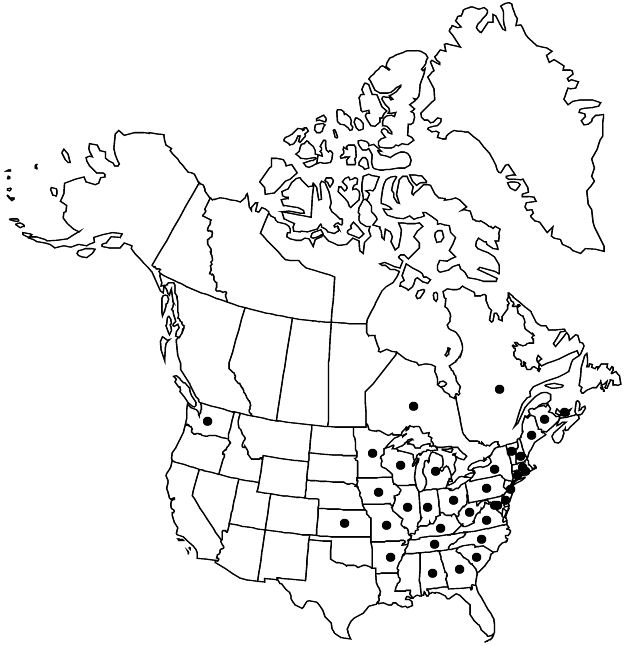Difference between revisions of "Celastrus orbiculatus"
in J. A. Murray, Syst. Veg. ed. 14, 237. 1784.
Common names: Oriental bittersweet
WeedyIntroduced
Treatment appears in FNA Volume 12. Treatment on page 120.
FNA>Volume Importer |
imported>Volume Importer |
||
| (One intermediate revision by the same user not shown) | |||
| Line 1: | Line 1: | ||
{{Treatment/ID | {{Treatment/ID | ||
|accepted_name=Celastrus orbiculatus | |accepted_name=Celastrus orbiculatus | ||
| − | |accepted_authority=Thunberg | + | |accepted_authority=Thunberg |
|publications={{Treatment/Publication | |publications={{Treatment/Publication | ||
| − | |title=Syst. Veg. ed. | + | |title=in J. A. Murray, Syst. Veg. ed. |
|place=14, 237. 1784 | |place=14, 237. 1784 | ||
|year=1784 | |year=1784 | ||
| Line 31: | Line 31: | ||
|elevation=0–900 m. | |elevation=0–900 m. | ||
|distribution=N.B.;Ont.;P.E.I.;Que.;Ala.;Ark.;Conn.;Del.;D.C.;Ga.;Ill.;Ind.;Iowa;Kans.;Ky.;Maine;Md.;Mass.;Mich.;Minn.;Mo.;N.H.;N.J.;N.Y.;N.C.;Ohio;Pa.;R.I.;S.C.;Tenn.;Vt.;Va.;Wash.;W.Va.;Wis.;Asia (China;Japan;Korea). | |distribution=N.B.;Ont.;P.E.I.;Que.;Ala.;Ark.;Conn.;Del.;D.C.;Ga.;Ill.;Ind.;Iowa;Kans.;Ky.;Maine;Md.;Mass.;Mich.;Minn.;Mo.;N.H.;N.J.;N.Y.;N.C.;Ohio;Pa.;R.I.;S.C.;Tenn.;Vt.;Va.;Wash.;W.Va.;Wis.;Asia (China;Japan;Korea). | ||
| + | |introduced=true | ||
|discussion=<p><i>Celastrus orbiculatus</i> has become a seriously invasive plant in much of eastern North America.</p> | |discussion=<p><i>Celastrus orbiculatus</i> has become a seriously invasive plant in much of eastern North America.</p> | ||
|tables= | |tables= | ||
| Line 40: | Line 41: | ||
-->{{#Taxon: | -->{{#Taxon: | ||
name=Celastrus orbiculatus | name=Celastrus orbiculatus | ||
| − | |authority=Thunberg | + | |authority=Thunberg |
|rank=species | |rank=species | ||
|parent rank=genus | |parent rank=genus | ||
| Line 52: | Line 53: | ||
|introduced=true | |introduced=true | ||
|reference=None | |reference=None | ||
| − | |publication title=Syst. Veg. ed. | + | |publication title=in J. A. Murray, Syst. Veg. ed. |
|publication year=1784 | |publication year=1784 | ||
|special status=Weedy;Introduced | |special status=Weedy;Introduced | ||
| − | |source xml=https:// | + | |source xml=https://bitbucket.org/aafc-mbb/fna-data-curation/src/2e0870ddd59836b60bcf96646a41e87ea5a5943a/coarse_grained_fna_xml/V12/V12_586.xml |
|genus=Celastrus | |genus=Celastrus | ||
|species=Celastrus orbiculatus | |species=Celastrus orbiculatus | ||
Latest revision as of 19:16, 5 November 2020
Vines 40+ m. Leaves: blade suborbiculate to broadly oblong-obovate or ovate-orbiculate, 4–6 × 3–5 cm, aestivation conduplicate. Inflorescences axillary, cymes, 1–2 cm. Staminate flowers: pollen white. Capsules yellow when mature, globose, 7–10 mm diam., glabrous. Seeds orange, ellipsoid, 6 mm. 2n = 46.
Phenology: Flowering spring–summer.
Habitat: Thickets, woodland margins, open woods, roadsides, usually rich soils.
Elevation: 0–900 m.
Distribution

Introduced; N.B., Ont., P.E.I., Que., Ala., Ark., Conn., Del., D.C., Ga., Ill., Ind., Iowa, Kans., Ky., Maine, Md., Mass., Mich., Minn., Mo., N.H., N.J., N.Y., N.C., Ohio, Pa., R.I., S.C., Tenn., Vt., Va., Wash., W.Va., Wis., Asia (China, Japan, Korea).
Discussion
Celastrus orbiculatus has become a seriously invasive plant in much of eastern North America.
Selected References
None.
Lower Taxa
None.
... more about "Celastrus orbiculatus"
Oriental bittersweet +
N.B. +, Ont. +, P.E.I. +, Que. +, Ala. +, Ark. +, Conn. +, Del. +, D.C. +, Ga. +, Ill. +, Ind. +, Iowa +, Kans. +, Ky. +, Maine +, Md. +, Mass. +, Mich. +, Minn. +, Mo. +, N.H. +, N.J. +, N.Y. +, N.C. +, Ohio +, Pa. +, R.I. +, S.C. +, Tenn. +, Vt. +, Va. +, Wash. +, W.Va. +, Wis. +, Asia (China +, Japan + and Korea). +
true +
in J. A. Murray, Syst. Veg. ed. +
1784 +
Celastrus orbiculatus +
Celastrus +
species +